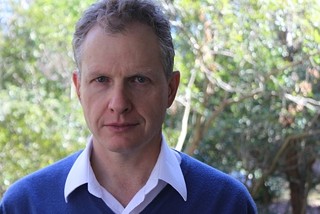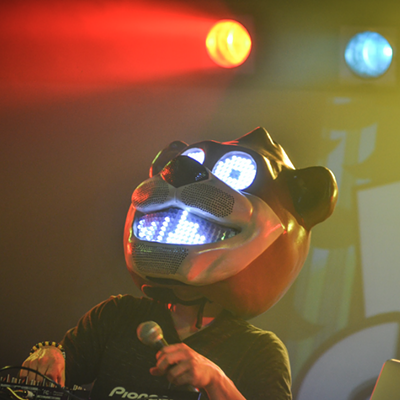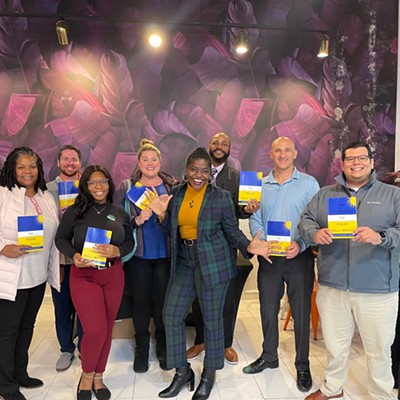James Lough's book, This Ain't No Holiday Inn: Down and Out at the Chelsea Hotel, touts Bohemian failure as creative impetus, blurs the line between starving artists and the criminal element, and thoroughly explores the historic pairing of creative-types with their substances of choice.
"The Chelsea Hotel is the greatest artist colony that ever existed in the United States," says the author and local writing professor.
In the '80s and '90s, New York City's Chelsea Hotel was a veritable Venus flytrap for club kids, niche celebutantes, punk royalty, poets, musicians, drag queens, dominatrices, pimps, drug dealers, porn stars, painters and photographers.
"I had a good book and I knew somebody would recognize that — I just thought they would recognize that a lot faster," Lough laughs.
Ten years, one agent and 65 rejections later, Lough was ready to give up when he saw an ad in the Atlantic for an off-Beat book published by Schaffner Press about Ken Kesey and the Merry Pranksters: Acid Christ.
"I thought: Anyone with the balls to publish a book called Acid Christ was gonna like my book," he says.
Schaffner not only liked it enough to publish it, they also just sent him on a 12-city West Coast book tour.
Lough holds a book release party at this Friday's edition of Seersucker Live, which will be held at The Pirate's House on East Broad Street downtown from 7:30-9 p.m.
"I accidentally ran into this story. It was put into my lap by my ex-brother-in-law, Robert Campbell. He’s a big chatter – he just talks and talk and talks – after awhile I just kind of tune him out,” Lough recounts. "He said, 'Hey, you ever heard of Herbert Hunke? He was the first Beat writer, I used to live next to that guy.' I was an English major snob. A Ph.D. in literature. I read the Beats, lived in Beat cities. I'd seen them on the streets of San Francisco and Boulder. And I'd never heard of Herbert Hunke."
As graceful emcee of this collaborative account, Lough sets the tone for chasing Chelsea counterculture during a bygone era of safety pins, punk rock and anti-establishment.
While conducting research, Lough visited the Chelsea twice and interviewed as many former residents as he could dig up. What followed was a reunion of sorts.
"Robert said to just leave the door open, that's the sign that people could hang. Someone invariably brought the weed. Pretty soon we were having what former bellman Paul Volmer called a 'Chelsea moment.'"
"One chick, she was a rich girl with schizophrenia or something. She basically said, 'I'll go to bed with you if I can spend the night in your room.' She was just fucking her way into the Chelsea. She and Robert were on the floor because I was the one paying for the room," Lough says. "I just put in earplugs and thought, hey. Whatever."
It all reads like a Chelsea moment; as if you've just lit up in a roach-infested room with punk artists who used to be on the scene, as they spin campfire tales of seedy underbelly.
Perhaps the most compelling ghost story is from Campbell's jam sessions with a post-Ramone's Dee Dee Ramone, who was at the Chelsea trying to get clean.
"There was a sense of magic there and I felt it, created by the people. Because of the freedom: freedom to create, freedom to screw themselves up, freedom to do anything as long as they didn't bother other tenants."
This Aint No Holiday Inn is a bittersweet bricolage. Since the property changed hands in 2011, there are no more opportunities for Chelsea moments. The new management isn't too keen on its offbeat heritage; visitors aren't even allowed in the lobby.
"It's dead, gone, they're not bringing it back. It's so awful it could make you cry," Lough laments. "It's all part of a bigger picture: Fledgling artists can't afford to live in New York anymore. The artists who are there have already made it or they're rich kids. New York doesn't have that magic anymore, that hunger, that edge."
If there's hope for a modern quasi-renaissance, Lough thinks the smaller towns could make it happen — great news for Savannah's up-and-coming artists. At least the ones outside of what he dubs hipster "fauxhemia."
"Millennials don't feel any need to rebel. They're a very conservative, very materialistic generation. I don't think they believe Tide is going to make their clothes whiter. But if you separate what they're selling from the ad itself, they want that lifestyle," Lough outlines the problem.
"Why else would they buy their clothes at American Apparel?"





























